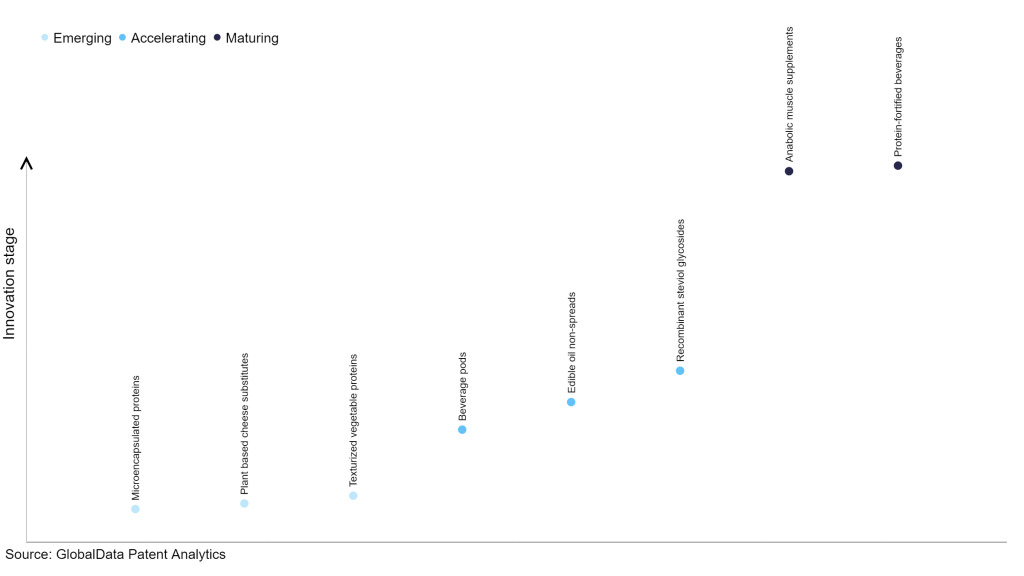The consumer industry continues to be a hotbed of patent innovation. Activity is driven by guided health, wellbeing, and personalized nutrition, and growing importance of technologies such as plant-based alternative proteins, 3D food printing, and digital food management. In the last three years alone, there have been over 52,000 patents filed and granted in the consumer industry, according to GlobalData’s report on Innovation in consumer: plant-based cheese substitutes. Buy the report here.

Discover B2B Marketing That Performs
Combine business intelligence and editorial excellence to reach engaged professionals across 36 leading media platforms.
However, not all innovations are equal and nor do they follow a constant upward trend. Instead, their evolution takes the form of an S-shaped curve that reflects their typical lifecycle from early emergence to accelerating adoption, before finally stabilizing and reaching maturity.
Identifying where a particular innovation is on this journey, especially those that are in the emerging and accelerating stages, is essential for understanding their current level of adoption and the likely future trajectory and impact they will have.
30+ innovations will shape the consumer industry
According to GlobalData’s Technology Foresights, which plots the S-curve for the consumer industry using innovation intensity models built on over 12,000 patents, there are 30+ innovation areas that will shape the future of the industry.
Within the emerging innovation stage, microencapsulated proteins, plant-based cheese substitutes, and texturized vegetable proteins are disruptive technologies that are in the early stages of application and should be tracked closely. Beverage pods, edible oil non-spreads and recombinant steviol glycosides are some of the accelerating innovation areas, where adoption has been steadily increasing. Among maturing innovation areas are anabolic muscle supplements and protein-fortified beverages, which are now well established in the industry.
Innovation S-curve for the consumer industry

Plant-based cheese substitutes is a key innovation area in consumer
Plant-based cheese substitutes are dairy-free alternatives to cheese made from animal milk that mimic the taste, texture, and appearance of traditional cheese. These substitutes can be made from a range of plant-based sources, including nuts, seeds, legumes, and grains, and often incorporate scientific methods to achieve cheese-like properties.
GlobalData’s analysis also uncovers the companies at the forefront of each innovation area and assesses the potential reach and impact of their patenting activity across different applications and geographies. According to GlobalData, there are 35+ companies, spanning technology vendors, established consumer companies, and up-and-coming start-ups engaged in the development and application of plant-based cheese substitutes.
Key players in plant-based cheese substitutes – a disruptive innovation in the consumer industry
‘Application diversity’ measures the number of applications identified for each patent. It broadly splits companies into either ‘niche’ or ‘diversified’ innovators.
‘Geographic reach’ refers to the number of countries each patent is registered in. It reflects the breadth of geographic application intended, ranging from ‘global’ to ‘local’.
Chr. Hansen is one of the leading patent filers in plant-based cheese substitutes. Some other key patent filers in the space include Impossible Foods, Fuji Oil, and Savencia. Chr. Hansen has introduced the innovative VEGA Boost cultures, enabling the creation of a dairy-free cream cheese. According to the company, this plant-based cream cheese alternative offers a nutritional composition comparable to that of dairy cream cheese.
In terms of application diversity, Archer Daniels Midland leads the pack, with Kerry Group and Valsoia in the second and third positions, respectively. By means of geographic reach, Nissui holds the top position, followed by Shin-Etsu Chemical and Archer Daniels Midland.
Plant-based cheese substitutes will find increased adoption among people in the coming years. Many people are becoming more health-conscious and are seeking alternatives to traditional dairy products. Plant-based cheese substitutes often have lower levels of saturated fat and cholesterol compared to dairy cheese, making them a healthier option for individuals looking to reduce their intake of these components.
To further understand the key themes and technologies disrupting the consumer industry, access GlobalData’s latest thematic research report on Consumer.
Data Insights
From

The gold standard of business intelligence.
Blending expert knowledge with cutting-edge technology, GlobalData’s unrivalled proprietary data will enable you to decode what’s happening in your market. You can make better informed decisions and gain a future-proof advantage over your competitors.




